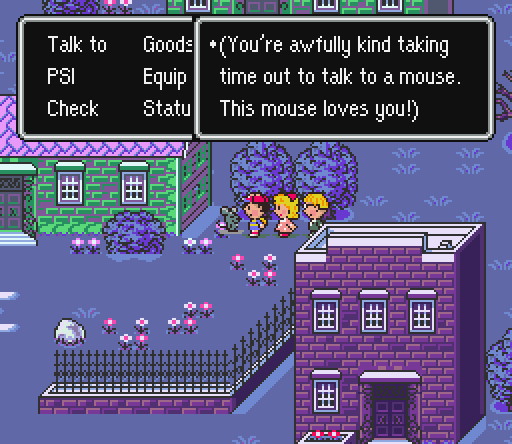Earthbound isn’t the first story to involve children who go on to save the world. But it might be the only one where the forerunner to the chosen ones—a fly called Buzz Buzz, recently arrived on a crashed meteorite—is smacked out of the sky by an oblivious, rich mother. And it might be one of the only games where the child protagonist, after leaving their parents, their friends, and their hometown for parts unknown, can become Homesick—a status condition. Being Homesick means your mind sometimes drifts off, keeps you from being able to face your enemies. You can cure it by calling your mom.
It’s no secret that Earthbound parodies typical RPGs. Some of your enemies are hippies, and the game often pokes fun at RPG tropes—NPCs will sometimes ask why you keep talking to them, unusual dialogue options (e.g, saying “No” to a required quest) will result in an indignant response, and so on. There is a man named “Lier X. Agerate.” But probably the more important and impactful aspect, both on subsequent games and on the player, is the incredibly simple but vital theme of love—simple, unabashed love. Giygas, the antagonist of this entry in the series, is practically a manifestation of hateful feelings. He is defeated, spoilers, by love, by human emotion. Almost every point of eal evil in the game is a matter of love, or a lack of it. You come across statues causing those near them to become greedy, you defeat your nightmares to gain the inner peace required to save the world, you help a band out of horrible debt, among other things. And I’m certainly not ignoring the countless other pieces of storytelling where the central theme is also, say, Love, or Friendship, or Teamwork. But Earthbound, as opposed to many other pieces of art directed at children or young adults, makes a point to incorporate this into its story and mechanics in a way that goes beyond superficial dialogue.
And I believe that it’s in this sense that Earthbound has had the greater, more consequential impact on the games that followed. Its humor has been influential, its parody has been influential, but its emphasis on truly enacting care and kindness—to oneself and others—is probably its most influential aspect of all. Undertale, one of many games that cite it as inspiration, is probably the best example of this—that being, that the game is essentially all about love, and about caring for everyone you come across. “The friendly RPG where nobody has to die.”
Earthbound, in spite of not going quite this far, clearly has a stake in imparting valuable lessons about home, about love, and about taking care of oneself. You visit eight “sanctuaries” throughout the game, where you have brief visions: a “small, cute puppy,” your mother telling you to “be thoughtful, strong boy,” “a baby in a red cap,” and so on. Even Pokey, perhaps one of the most unlikable characters in the story, is sympathetic in his own right, as his parents are implied to be abusive towards him early on in the game. The game not only tells you that love, or friendship, or teamwork are important, it makes you live it, in a way that games like Undertale—much later—would take and run with to their logical endpoint.PSI Love, as stated in the title of this review, doesn’t appear directly in the game. That is, “PSI Rockin” is the canonical name of Ness’s most powerful special attack. You are asked your favorite thing at the beginning of the game, and whatever is inputted becomes this word. In spite of this, however, there are multiple “default” options at each part of the character creation process, and “Love” is one of these. To jump forward in time a bit, “PK Love” is the canonical name for the most powerful attack in Mother 3, and, given the series’ aforementioned mechanical and narrative themes, this seems like no coincidence. Earthbound is, to put it simply, all about love, and it is perhaps one of the first games to explore this theme in a way that takes advantage of games’ particular advantages as a medium. In no other medium could you be forced to live and cope with homesickness, to have to call your mother to relieve it, to yourself take those meditative moments at each sanctuary, and so on and so forth. I realize that two other people have posted Earthbound reviews prior to this, but hopefully, in this additional review, I’ve been able to add one more little tidbit to the already very rich discourse on this game and its successors—spiritual and otherwise.
Works Cited
Earthbound. Nintendo, 1995.
Undertale. Toby Fox, 2015.

